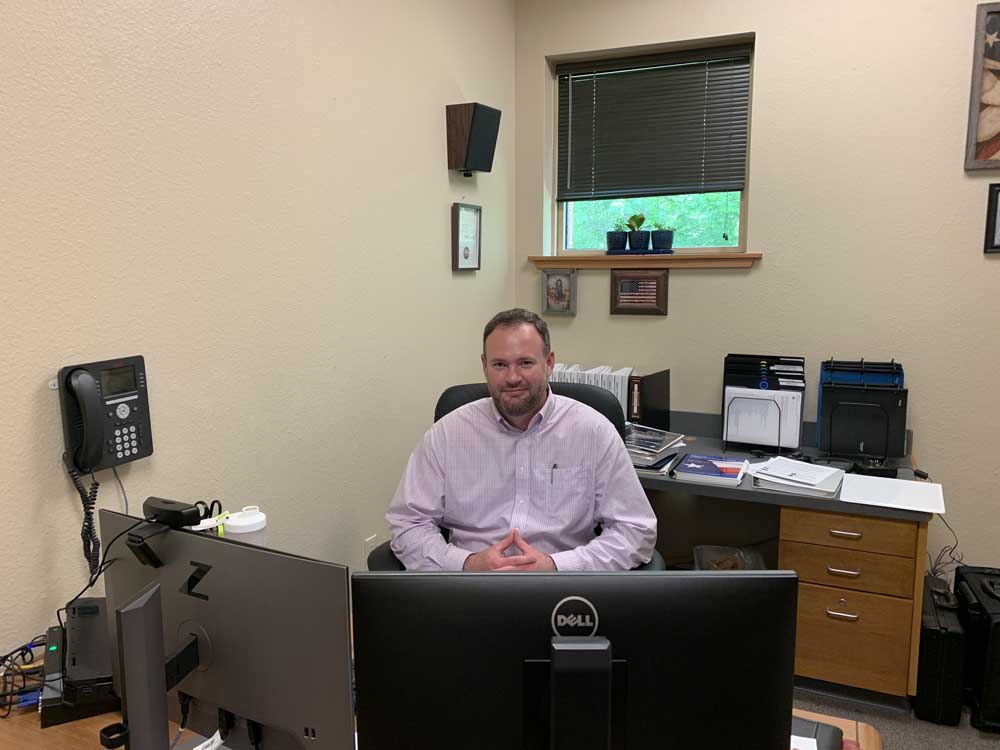Meet Brandon Moore, the new Smith County Emergency Management Coordinator
Published 5:40 am Tuesday, May 2, 2023

- Tyler resident Brandon Moore took over as Smith County Emergency Management Coordinator on April 3.
Emergency Management Coordinator was a secondary duty in the past, but with Tyler resident Brandon Moore officially on the job, he can concentrate on and strategize for disaster.
Smith County has chemical and energy companies, lakes, railways, interstates and major highways the public doesn’t generally think about.
“Having someone that is solely focused on those threats allows you to plan better for them,” Moore said.
Chad Hogue, Deputy Chief Fire Marshal, acted as Emergency Management Coordinator before Moore took over as Smith County EMC on April 3.
The Office of Emergency Management’s mission is to execute a workable emergency management plan designed to provide emergency services, shelter and food for the citizens and assist the State during disasters through mitigation, preparedness, response and recovery from disasters.
Smith County faces weather and hazardous material threats.
“Weather, that’s probably our most occurring threat, but I would say the one that has the most significance for the most destruction will be hazmat, most likely,” Moore said.
A situation involving hazardous materials is handled differently depending on what and the amount of substance released, he said.
Emergency management has four phases: mitigation, preparedness, response and recovery. Binders of plans mandated by the State and the Federal Emergency Management Agency covering each aspect are displayed in his office.
A key aspect of his job is modernizing and amending those plans.
“They’re outdated, so I have to update them. That’s the thing, they all have life cycles,” he said.
Before the EMC role, Moore worked as a county liaison with the Texas Division of Emergency Management. These emergency management personnel are trained and equipped to work as part of an incident management team to support local, regional and statewide efforts.
His work as county liaison gave him insight into the EMC role and familiarity with Smith County.
Moore was born in Longview and raised in a community called Brumley.
After graduating from Gilmer High School, he joined the U.S. Marine Corps and served 10 years in the infantry. His military background set in motion his aptitude for the EMC role.
“There’s a lot of planning that goes into it. It’s not just going out and doing what you see in the movies. It is very, very planning intensive,” he said.
His planning skills and eagerness to learn are two characteristics that made Moore an ideal candidate for the role. He wants to take the best practices from different locations and implement that in Smith County.
During the first few weeks, Moore met various city government officials, worked on updating the plans and handled a tornado scare.
Moore maintains the managerial functions of planning for emergencies. He creates a framework the community can use to reduce vulnerability to hazards and cope with disasters.
His short-term goals are to improve upon the county’s Local Emergency Planning Committee. This group helps protect its communities from hazardous material incidents, emergencies and disasters by bringing in more people.
Local Emergency Planning Committee members can be police, firefighters or everyday citizens.
Citizens can visit the Smith County Fire Marshal Facebook page and the Smith County website or sign up for the Mass Notification System, which allows emergency managers to notify citizens of information during local emergencies or disasters.
“You know your weaknesses and your needs better than anyone else. If you try to mitigate those factors as best you can by yourself, then it will help myself, this department and any responder help you,” Moore said.
For example, it is helpful to have a go-bag prepared with medication, treatment or comfort items for high-stress situations for people with a functional needs disability.
“If you have stuff like that planned and ready, then you’re already one step ahead,” he said.
The Community Wildfire Protection Plan is a way for people to take action and reduce the risk of catastrophic wildfires by reducing fuel or brush around a residence or structure. Or if a person knows their home might not survive pending weather emergencies, be informed about where storm and tornado shelters are located.
These are just a few ways regular citizens can be prepared during emergencies.
“I’m going to need your help,” Moore said. “Emergency Management is not just a one-person show. It is truly a community effort.”







